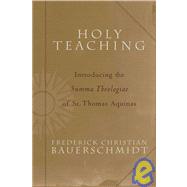
Note: Supplemental materials are not guaranteed with Rental or Used book purchases.
Purchase Benefits
Looking to rent a book? Rent Holy Teaching : Introducing the Summa Theologiae of St. Thomas Aquinas [ISBN: 9781587430350] for the semester, quarter, and short term or search our site for other textbooks by Bauerschmidt, Frederick Christian. Renting a textbook can save you up to 90% from the cost of buying.
| Introduction | 11 | (16) | |||
| Prologue to the Summa Theologiae | 27 | (4) | |||
| THE FIRST PART | |||||
|
31 | (14) | |||
|
|||||
|
|||||
|
|||||
|
|||||
|
|||||
|
45 | (12) | |||
|
|||||
|
|||||
|
|||||
|
57 | (4) | |||
|
|||||
|
61 | (5) | |||
|
|||||
|
|||||
|
66 | (7) | |||
|
|||||
|
|||||
|
73 | (7) | |||
|
|||||
|
|||||
|
80 | (6) | |||
|
|||||
|
86 | (7) | |||
|
|||||
|
93 | (8) | |||
|
|||||
|
101 | (8) | |||
|
|||||
| THE FIRST HALF OF THE SECOND PART | |||||
|
109 | (3) | |||
|
|||||
|
112 | (4) | |||
|
|||||
|
116 | (3) | |||
|
|||||
|
119 | (3) | |||
|
|||||
|
122 | (11) | |||
|
|||||
|
|||||
| THE SECOND HALF OF THE SECOND PART | |||||
|
133 | (12) | |||
|
|||||
|
|||||
|
|||||
|
|||||
|
145 | (3) | |||
|
|||||
|
148 | (4) | |||
|
|||||
|
152 | (4) | |||
|
|||||
|
156 | (7) | |||
|
|||||
| THE THIRD PART | |||||
|
163 | (13) | |||
|
|||||
|
000 | ||||
|
|||||
|
176 | (6) | |||
|
|||||
|
182 | (5) | |||
|
|||||
|
187 | (5) | |||
|
|||||
|
192 | (6) | |||
|
|||||
|
198 | (6) | |||
|
|||||
|
204 | (5) | |||
|
|||||
|
209 | (10) | |||
|
|||||
|
|||||
|
|||||
|
219 | (4) | |||
|
|||||
|
223 | (14) | |||
|
|||||
|
|||||
|
|||||
|
|||||
|
237 | (3) | |||
|
|||||
|
240 | (5) | |||
|
|||||
|
245 | (4) | |||
|
|||||
|
249 | (4) | |||
|
|||||
|
253 | (5) | |||
|
|||||
|
258 | (5) | |||
|
|||||
|
263 | (4) | |||
|
|||||
|
267 | (7) | |||
|
|||||
|
274 | (4) | |||
|
|||||
|
278 | (7) | |||
|
|||||
|
|||||
|
285 | (12) | |||
|
|||||
|
|||||
|
297 | (5) | |||
|
|||||
|
302 | (5) | |||
|
|||||
| Glossary of Names | 307 | (4) | |||
| Suggestions for Further Reading | 311 | (5) | |||
| Index | 316 |
The New copy of this book will include any supplemental materials advertised. Please check the title of the book to determine if it should include any access cards, study guides, lab manuals, CDs, etc.
The Used, Rental and eBook copies of this book are not guaranteed to include any supplemental materials. Typically, only the book itself is included. This is true even if the title states it includes any access cards, study guides, lab manuals, CDs, etc.